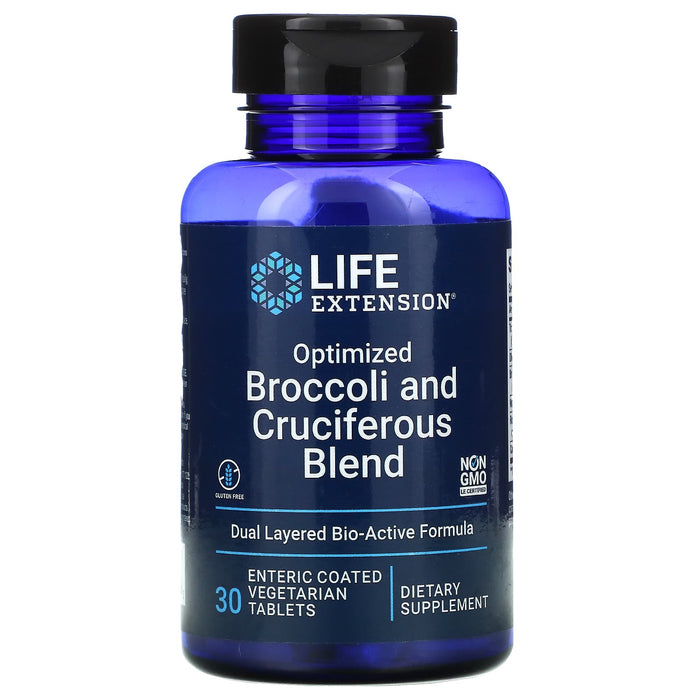




| Serving Size: 1 Enteric Coated Vegetarian Tablet | ||
| Servings Per Container: 30 | ||
| Amount Per Serving | % Daily Value | |
| TrueBroc® broccoli extract (seed) [std. to 10% glucoraphanin] |
300 mg |
** |
| DIM (3,3'-diindolylmethane) |
100 mg |
** |
| BroccoVital®Myrosinase broccoli extract (aerial parts) [providing myrosinase] |
75 mg |
** |
| Watercress 4:1 extract (whole herb) |
50 mg | ** |
| Rosemary extract (leaf) [std. to 20% diterpenic compounds, providing carnosic acid/carnosol] |
50 mg |
** |
| Cabbage extract (leaf) |
25 mg | ** |
| **Daily Value not established. | ||
Promote detoxification and cellular health with Optimized Broccoli and Cruciferous Blend by Life Extension.
Optimized Broccoli and Cruciferous Blend is a dual-layered, bio-active supplement that delivers the cell-protective and health-promoting benefits of raw cruciferous vegetables. This innovative formula separates myrosinase from glucoraphanin in a dual-layered tablet to optimize the conversion of glucoraphanin to sulforaphane, providing the powerful benefits of raw broccoli without the need to consume leafy greens.
Read the entire label and follow the directions carefully prior to use.
Take one (1) tablet daily, or as recommended by a healthcare practitioner.
Microcrystalline cellulose, maltodextrin, coating (methacrylic acid copolymer dispersion NF, hypromellose, propylene glycol), croscarmellose sodium, stearic acid, silica.
At Health Orchard, we are committed to providing accurate product information and images. However, manufacturers may update their product packaging or ingredients, and these changes may not be immediately reflected on our website. It's possible for products to be shipped with different packaging than what is shown online. For the most accurate and safe use of any product, we advise reading the product's label, warnings, and instructions rather than relying solely on the details provided by Health Orchard.
Broccoli supplements offer concentrated doses of beneficial compounds found in broccoli, particularly sulforaphane. These supplements may provide antioxidant and anti-inflammatory benefits, potentially supporting cellular health and detoxification processes. Some studies suggest that broccoli supplements may also contribute to heart health, cognitive function, and overall wellness.
Cruciferous vegetables offer a wide array of health benefits due to their rich nutrient profile. They are high in fiber, vitamins, and minerals, and contain unique compounds like glucosinolates and indole-3-carbinol. These vegetables may support digestive health, boost immune function, and potentially reduce the risk of certain cancers.
While all cruciferous vegetables offer health benefits, broccoli is often considered one of the healthiest due to its particularly high nutrient density. It's rich in vitamin C and vitamin K, folate, and fiber, as well as powerful antioxidants like sulforaphane. However, it's important to note that a variety of cruciferous vegetables in your diet can provide a broader range of beneficial compounds and nutrients.
Cruciferous vegetables are a family of plants in the Brassicaceae (or Cruciferae) family, characterized by their cross-shaped flowers. The term "cruciferous" comes from the Latin word crux, meaning cross. These vegetables are known for their distinctive, often slightly bitter flavor and are prized for their nutritional value and potential health benefits.
While cruciferous vegetables are generally healthy for most people, some individuals may need to limit their intake. People with thyroid issues, particularly those with hypothyroidism, may need to be cautious as these vegetables contain goitrogens, which can interfere with thyroid function when consumed in large amounts.
Two common examples of cruciferous vegetables are broccoli and cauliflower. Both are widely consumed and offer numerous health benefits. Broccoli is known for its dark green florets and stalks, while cauliflower is typically white with a compact head. These vegetables are versatile in cooking and can be eaten raw, steamed, roasted, or incorporated into various dishes.